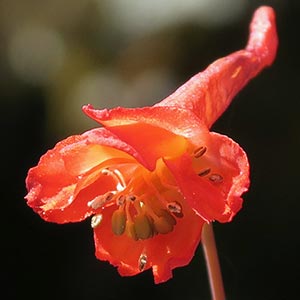Delphinium nudicaule
Delphinium hesperium
canyon delphinium, canyon larkspur, orange larkspur, red larkspur, red or orange larkspur, scarlet larkspur
foothill larkspur, western larkspur
(15-)20-50(-125) cm;
base reddish, glabrous.
(11-)40-80(-120) cm;
base usually reddish, longitudinally ridged, puberulent.
blade round to pentagonal, 2-6 × 3-10 cm; ultimate lobes 3-12, width 5-40 mm (basal), 2-20 mm (cauline).
blade round to pentagonal, 1-4 × 2-6 cm, usually puberulent, especially abaxially; ultimate lobes 3-14, width 3-8 mm (basal), 2-5 mm (cauline).
5-20(-69)-flowered;
pedicel (1.5-)2-6(-8) cm, glabrous to glandular-pubescent;
bracteoles 14-20(-30) mm from flowers, green to red, linear, 2-4(-9) mm, glabrous to puberulent.
(5-)15-30(-100)-flowered, moderately open;
pedicel (0.5-)1-2.5(-7.5) cm, puberulent;
bracteoles 2-6(-12) mm from flowers, green to blue, margins often white, linear-lanceolate, 3-7(-12) mm, puberulent.
sepals scarlet to reddish orange, rarely dull yellow, glabrous, lateral sepals forward-pointing to form pseudotube, (6-)8-13(-16) × 3-6 mm, spurs straight, slightly ascending, (12-)18-27(-34) mm;
lower petal blades elevated, exposing stamens, 2-3 mm, clefts 0.5-1 mm;
hairs sparse, evenly dispersed, yellow.
sepals dark blue to white, puberulent, lateral sepals spreading, 7-13(-16) × 3-10 mm, spurs straight to upcurved, ascending 30-45° above horizontal, 9-18 mm;
lower petal blades slightly elevated, ± exposing stamens, 3-8 mm, clefts 1-5 mm;
hairs centered, denser on inner lobes near base of cleft, white.
13-26 mm, 3.5-4.5 times longer than wide, glabrous.
8-18 mm, 2.2-3(-4.2) times longer than wide, sparse puberulent.
unwinged or sometimes slightly wing-margined;
seed coat cells with surfaces smooth.
not echinate, appearing ± smooth to naked eye;
seed coat cells with margins straight, surfaces smooth or roughened.
= 16.
Delphinium nudicaule
Delphinium hesperium
Delphinium nudicaule hybridizes with most other taxa of Delphinium that it encounters. Apparent hybrids involving D. nudicaule, and seen by the author (either afield or as specimens), include D. andersonii, D. antoninum, D. decorum, D. luteum, D. nuttallianum, D. patens, and D. trolliifolium. In addition, garden-grown plants have been hybridized with D. cardinale, D. elatum, D. menziesii, D. parishii, D. penardii, D. tatsienense Franchet, D. triste Fischer ex de Candolle, and D. uliginosum; D. nudicaule does not naturally occur with these species. Delphinium nudicaule is one of the earliest larkspurs to flower in any given locality. Douglas's type collection of D. nudicaule represents plants (synonyms D. sarcophyllum Hooker & Arnott and D. peltatum Hooker, an invalid name) grown under very moist conditions, probably quite near the ocean. The type specimen of D. armeniacum A. Heller represents plants grown under unusually dry conditions.
The Mendocino Indians consider Delphinium nudicaule a narcotic (D. E. Moerman 1986).
(Discussion copyrighted by Flora of North America; reprinted with permission.)
Subspecies 3 (3 in the flora).
Delphinium hesperium is thought to be poisonous to cattle (D. E. Moerman 1986, no subspecies specified). It is often confused with D. hansenii. See discussion under that species for distinguishing features.
(Discussion copyrighted by Flora of North America; reprinted with permission.)
1. Lateral sepals 4(–5) mm wide or less; inflorescence dense (individual flowers often touching in pressed specimens). | subsp. cuyamacae |
1. Lateral sepals more than 4 mm wide; inflorescence open (individual flowers seldom touching in pressed specimens). | → 2 |
2. Sepals dark blue-purple. | subsp. hesperium |
2. Sepals white to pinkish, rarely light blue. | subsp. pallescens |


